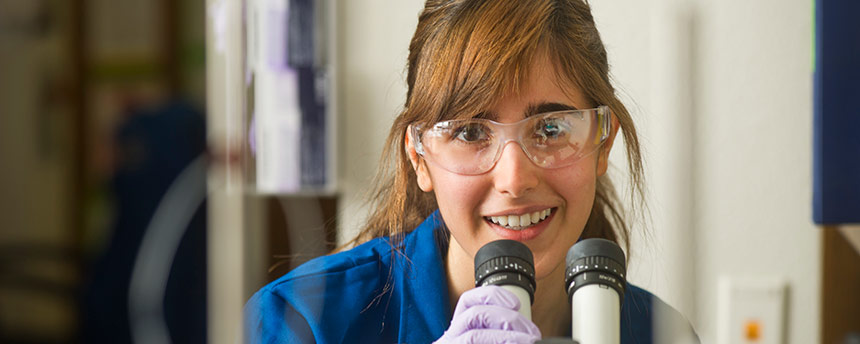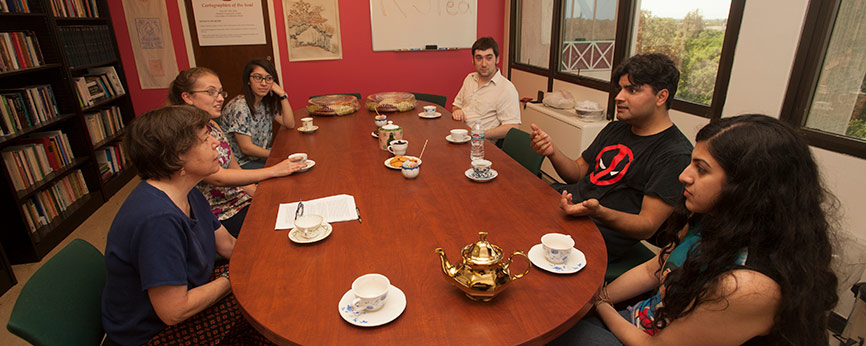When choosing a college major, the question of “purpose” inevitably arises for students. Four years can fly by, with parents’ tolerance for big bills souring along the way. But consider the ways in which an emphasis in religious studies led sophomore Dinar Kurji to surprising discoveries about himself:
“Biochemistry. Biomedicine. In the list of possible majors provided to my parents online, they never made it past the “B”s! Anything with “biology” was what my parents wanted to hear. The problem was: I didn’t want to pursue a major that I dreaded. Growing up Muslim in a Catholic school in Texas, I had always found religion fascinating. Lessons in high school, however, had focused exclusively on theology. It was only later, when I made it to the “R”s in the online catalog, that I learned about religious studies. Offering a comparative approach to the study of religion outside the religious seminary, a religious studies major could allow me to merge my interests in the soul with medicine and science. I thought: how cool would it be to help bring souls into the world by working as an OB/GYN? While I decided to double major, keeping an emphasis on obstetrics and gynecology, my major in religious studies made college possible for me.”

Former Secretary of State John Kerry put it this way: “If I went back to college today, I think I would probably major in comparative religion. Because that is how integrated it is in everything we are working on and deciding and thinking about in life today.”
Religious studies gives insights for motivation
In an increasingly globalized and interconnected world, religion does more than move mountains. It also moves minds, nations and world leaders. More than any other academic discipline, says UC Davis Professor Seth Sanders, religious studies provides insight into the ways in which various cultures through history have modeled what most motivates people.
With over a dozen faculty members and one of most vibrant programs in California, the Department of Religious Studies at UC Davis puts the transformative and, indeed, revolutionary aspects of religion at the front lines of its course offerings.
From Hindu goddesses to ethical eating
Interested in how struggling social groups have organized collective resistance against all odds? Take the course on “Hindu Women and Goddesses.” Wondering how food choices are changing the planet? Take a course on “Ethical Eating.” Frustrated by news coverage of the Islamic world that dwells incessantly on terror attacks? Learn about how Muslims are navigating real-world issues in the course “Sex, Marriage and Divorce.” Or take a class in “Modern Islam.” The major will also have expanded course offerings in Jainism, thanks to a recent $1.5 million gift and the new hire of Assistant Professor Lynna Dhanani.
If one thing is patently clear, it is that religious studies allows you to leap headlong into the world’s greatest literary traditions. While deities spurn bad translations, they sure like good ones. “One thing God has spoken,” the Book of Psalms notes, “two things I have heard.”
Stories, poems, songs, historical narratives, personal confessions, mystical treatises, compendia of legal debates, all of which can walk right off the page into dynamic rituals involving performance and dance: This is stock in trade for religious studies majors.
Students learn analytic skills
Josh Shahryar, a junior, came to appreciate the ways familiarity with such a repertoire helped him hone his analytic skills: “Religious studies has helped me become a much better researcher because of the variety of different texts from different time periods, some in often very different languages, that I had to read and investigate.”
For junior Tessa Oates, such a focus comes with tremendous personal growth:
“My classes have given me an outlet to ponder and analyze questions about suffering and God and ethics that have troubled human beings for centuries; they’ve given me the material and the awareness to think about these issues and realize that there are so many viewpoints, so many nuances even within a religious tradition. My RST major has been much more than a series of classes and a piece of paper … it has been a transformative experience. I have grown from a teenager who was very timid and uncertain about this world to an adult who is now ready to live and be a part of it.”
Low student-faculty ratio

Even as they attend a world-famous research university, religious studies majors benefit from an extraordinarily low student-faculty ratio (roughly 4 to 1), which allows them to get to know their professors on a personal basis.
Weekly, open gatherings for the “Religious Studies Tea” hour are complemented by an undergraduate peer-advisor program, a “Notes from the Field” lecture series, regular engagement with teaching assistants from the Graduate Group for the Study of Religion, undergraduate research conferences, and, for students eager to take on a supervised independent study project, the capstone senior thesis program.
Among the religious traditions in which faculty members specialize are Hinduism, Buddhism, Judaism, Christianity Jainism and Islam.
A graduate degree in human rights
For students such as senior Grace Ramirez, the department’s particular strength lies in showing students how to “contribute to the world in a meaningful way.”
Heading to Duke University in the fall for a graduate degree in human rights, Ramirez says:
“Religion and culture are so important to human rights. My religious studies major showed how much international law is not just about litigation. It’s about people and requires a deep understanding of what they believe in.”
At UC Davis, growing coordination between its own Human Rights Studies Program and the Department of Religious Studies are offering undergraduate students pathways to exciting careers across the globe.
Professor Flagg Miller teaches about modern Muslim societies. He has interdisciplinary interests in religion, language and literature, media studies, anthropology and security studies.
